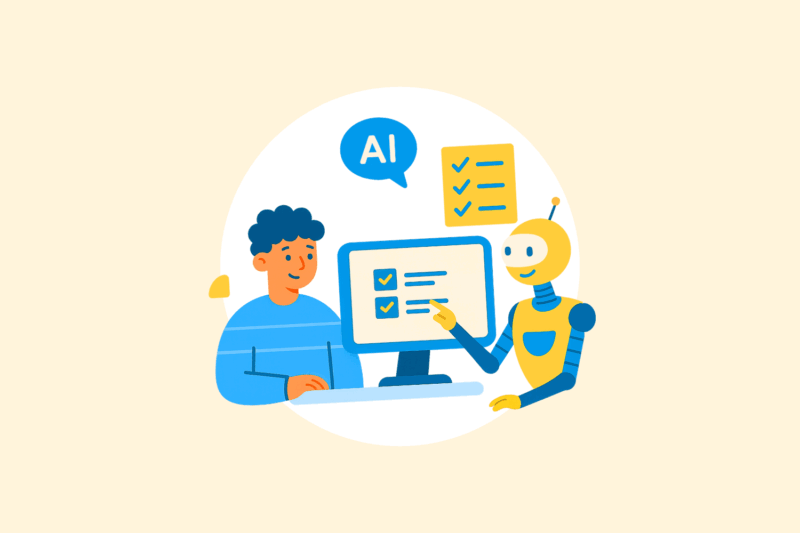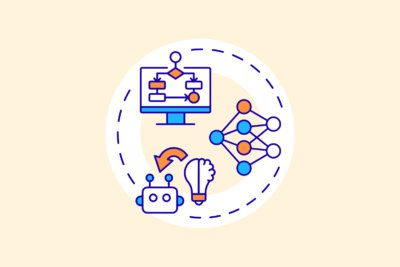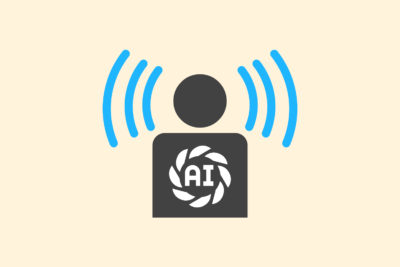AI content and SEO: opportunities and risks for the coming years

AI content has long since ceased to be a new phenomenon. For many organizations, texts written with AI are now an integral part of their content strategy. The technology is evolving rapidly: AI tools not only generate texts, but also perform keyword analysis and can process contextual links.
Yet in addition to opportunities, the development of AI also brings obvious risks to SEO.
The opportunities of AI content for SEO
AI speeds up the content process and enriches your texts, if you use it in the right way. With AI, it is possible to produce large amounts of content in a short period of time. This makes it feasible to build topical authority faster within a given topic. The content must then remain relevant and unique.
Data-driven optimization
AI models recognize patterns in search behavior and competition. This allows you to create more content that better matches search intentions and themes.
Faster experiments and iterations
Because AI quickly generates new versions of content, testing headings, structures and angles becomes easier. This makes it possible to continuously refine content.
The risks of AI content for SEO
The same features that make AI so powerful also bring dangers. For example, a lack of distinctiveness sometimes arises. AI models draw on existing data. Without human guidance, the output becomes generic or predictable, preventing your content from offering unique value.
Although AI is getting better, it can still make mistakes or use outdated information. This can hurt the reliability of your content.
Sommige AI-tools creëren teksten die te sterk gefocust zijn op zoekwoorden of te voorspelbaar zijn in structuur. Zoekmachines herkennen dit als onnatuurlijk, wat de ranking beïnvloedt. Juist op dit punt wordt de menselijke factor onmisbaar: mensen herkennen keywordstuffing direct en zijn beter in staat minder voorspelbare teksten te schrijven. (1)
Getting started with SEO? Feel free to get in touch.

The role of human supervision
AI can do a lot, but without human oversight, the content remains flat. The power lies in the combination of AI and humans. Let AI do the prep work, but make sure a specialist rewrites the content in a human tone. Always check the facts, adapt the tone-of-voice to your target audience and add insights that only an expert can provide. This creates content that is produced quickly but still feels human and compelling.
More impact with AI: how an online educator improved its content strategy
An online training platform used AI to quickly write new course pages and blogs. A large amount of text was quickly available, but the results were disappointing: visitors barely read the texts and rarely clicked through to enroll.
We decided to use AI differently. Not as a writer, but as a tool. AI helped with data analysis and structure. Teachers and marketers supplemented the content with practical examples and their own insights.
Within four months, average reading time increased 46% and subscriptions increased 28%. The combination of AI and human expertise created content that finally really convinced.
AI content and E-E-A-T
Experience, Expertise, Authoritativeness and Trustworthiness continue to lead in content evaluation. AI helps with structure and construction, but it’s up to a content marketer to add things as needed. Consider mentioning author experience, linking to trusted sources and maintaining a consistent brand voice. It’s also important to include real-world examples. This makes a text lively.
With AI search engines selecting and summarizing content, it is increasingly important that your texts are readable, relevant and trustworthy. You strengthen E-E-A-T by making your expertise visible. You can do this through author pages, references and by continuing to publish regularly within your niche. (2)
Strategically deploying AI content
To use AI content effectively for SEO, it is wise to have a clear strategy. Therefore, use AI as a tool, not a substitute. Focus on unique angles. Add insights, examples or viewpoints that AI does not come up with.
Always monitor the performance of AI content and make adjustments as needed.
By taking this approach, you ensure that AI remains an empowering factor rather than a risk. A clear strategy prevents AI from diluting your brand voice. It also ensures that AI-generated content continues to contribute to your online authority.
Summary
Today, AI content has become an indispensable tool for SEO. Its success hinges on how you deploy it, though. Those who combine AI with human expertise build faster, more consistent and more strategic content that convinces both search engines and AI. Those who write their texts with only AI output, on the contrary, risk losing relevance and authority. Deploy technology as a tool, but your human insight should always guide you.
Frequently asked questions about AI content and SEO
AI content raises questions for many marketers: how far can you use it without risking it, and how do you make sure it actually adds value? Here are the answers to the questions I get most often in practice.
Is AI content good or bad for SEO?
AI content is not necessarily bad, as long as it is checked by a content marketer and rewritten and supplemented as needed. SEO results improve precisely when AI is used to bring structure, while experts ensure quality, nuance and reliability.
Can you completely rely on AI-generated texts?
AI may contain inaccuracies or use outdated information. Think of it as a tool that speeds up the writing process, but verification and adjustments by a specialist remain necessary.
How do search engines recognize AI content?
Google does not judge whether something is written with AI, but how valuable it is. As long as the text meets E-E-A-T principles (expertise, reliability and relevance), the production method makes little difference.
How do you best combine AI and human expertise?
Let AI do the preliminary work, such as setting up a structure or data analysis. Then a specialist refines the content, adds real-world examples and adjusts the tone-of-voice. This creates content that is produced quickly but feels human.
What are signs that AI content is not working well?
Declining engagement, low time on page or increasing bounce rate are clear signals of low-quality text. Often this is because the text is too general or repetitive. This is something that human editing can prevent.
| # | Source | Publication | Retrieved | Source last verified | Source URL |
|---|---|---|---|---|---|
| 1 | Google Search’s guidance on using generative AI content on your website (Google For Developers) | 21/05/2025 | 21/05/2025 | 06/10/2025 | https://developers.googl.. |
| 2 | What is E-E-A-T in SEO? (Semrush Blog) | 16/09/2025 | 16/09/2025 | 12/10/2025 | https://www.semrush.com/.. |
- Google For Developers. (21/05/2025). Google Search’s guidance on using generative AI content on your website. Google For Developers. Retrieved 21/05/2025, from https://developers.google.com/search/docs/fundamentals/using-gen-ai-content
- Team, S. (16/09/2025). What is E-E-A-T in SEO?. Semrush Blog. Retrieved 16/09/2025, from https://www.semrush.com/blog/what-is-e-e-a-t-in-seo/






